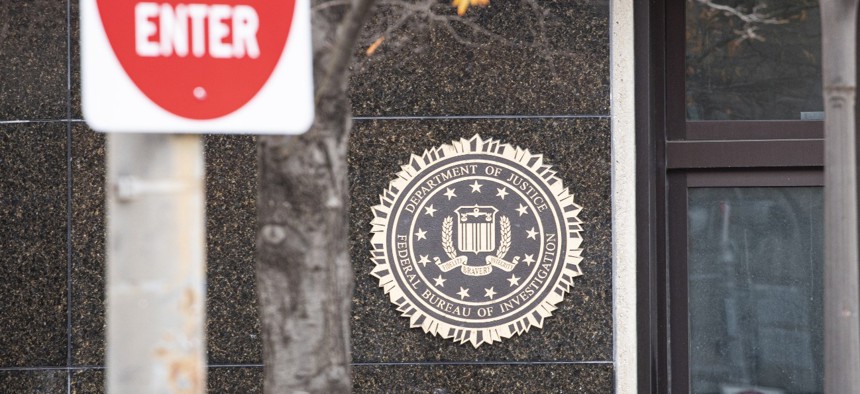
Half of the female trainees surveyed by the IG office, reported that academy staff/instructors told sexist stories or jokes, compared to 20% of the male trainees surveyed. Celal Gunes/Anadolu Agency via Getty Images
Women at the FBI Training Academy Faced Sexist Jokes and Other Inappropriate Behavior, IG Finds
The Justice Department inspector general made seven recommendations for addressing disparities, which the FBI agreed with.
“A substantial number of women” at the FBI training academy reported instructor behavior that went against the agency’s code of ethics, such as the of telling sexist stories, according to a recent report issued by a federal watchdog,
That is just one of the takeaways from a Justice Department inspector general office report issued on December 6 about gender equity at the FBI Academy, located in Quantico, Virginia, from 2015 to 2020. Specifically, the review looked at the basic field training courses––which involve academics, physical training, firearms, defensive tactics and tactical training––for new agent and intelligence analyst trainees. This review was prompted by a request from lawmakers of both parties following a lawsuit filed in 2019 alleging gender discrimination at the academy. The IG did not examine the specific claims made in the ongoing court case.
“We found that 94% of women and 96% of men successfully graduated from the basic field training course during our study period, and most trainees that we interviewed and surveyed felt that they were treated equitably throughout every training area,” the IG report stated. “However, we identified areas of disparity in how women were evaluated and treated that affected their experience at the academy, in addition to areas of risk that could affect equity.”
The IG found that female new agent trainees were disproportionately represented among the trainees who received suitability notations, which are citations for performance issues, compared to the overall population. In particular, notations on “tactical training” affected women disproportionately. While dismissal of trainees was rare, female new agent trainees had more referrals to and dismals from the Trainee Review Board than their male counterparts, the IG determined.
“Although we did not analyze or make judgments regarding individual [suitability notations, trainee review boards,] or dismissals, our analysis highlights areas that are more subjective and may have caused the disproportionate dismissals for women, thus illustrating the potential for inequity in the [basic field training course],” the report said. “In order to appropriately train and promote qualified candidates, it is in the [FBI training division's] interest to continue to monitor and analyze this data to identify equity concerns and inform changes to training where warranted.”
Most trainees who were interviewed and surveyed by the IG office said that trainees were treated equally at the academy, but both men and women had negative experiences during training.
“A substantial number of women described instructor behavior, including telling sexist stories, using offensive language, and other inappropriate behaviors, that went against the FBI’s Code of Conduct,” said the report. “Through OIG interviews, OIG survey responses, and FBI trainee assessments, some male and female trainees provided feedback on many aspects of training that depicted the culture at the academy as unprofessional, particularly in tactical training.”
Half of the female trainees surveyed by the IG office reported that academy staff/instructors told sexist stories or jokes, compared to 20% of the male trainees surveyed. Also, 48% of female respondents said staff/instructors “criticized trainees of my gender more compared to trainees of the opposite gender who were doing the same job,” compared to 15% of male respondents.
The IG also found that between 2015 and 2020, the Practical Applications Unit, which does tactical training, had 33 male tactical instructors and only one female instructor. Similarly, the Physical Training Unit, which is in charge of defensive tactical instruction, had 21 male defensive tactics instructors and only one female one.
“We believe that having more female instructors would have a positive effect on training for men and women by creating an environment in which [new agent trainees] feel more comfortable approaching and receiving instruction and feedback from a variety of instructors,” said the report. “We also believe that increasing gender diversity in the tactical and defensive tactics instructor staff may have a positive effect on women’s success in the [training] program for [new agent trainees].”
As a result of its review, the IG gave seven recommendations to improve gender equity in the basic field training course, and the FBI agreed with all of them.
Timothy Dunham, assistant director for the FBI’s training division, wrote in a response to the IG that the bureau looks forward to working with the IG office to address its concerns and recommendations. “The FBI has made gender equity a priority and has seen multiple improvements since this review was initiated,” he stated.
Not mentioned in his letter is that the FBI hired its first-ever chief diversity officer in April 2021. Representation of women in law enforcement has been an issue at the FBI, as well as across the federal government and in states and localities, but many are working to reverse that now.
The IG said this report builds on its previous report, issued in June 2018, on gender equity issues at the FBI; U.S. Marshals Service; Drug Enforcement Administration; and Bureau of Alcohol, Tobacco, Firearms and Explosives.
The watchdog stated, “ensuring that the women recruited by the FBI to become special agents have an equal opportunity to successfully graduate from the academy is a first step toward improving gender diversity at all levels and functions of the FBI and is critical to the FBI achieving its goal that its staff better represent the population it serves.”







